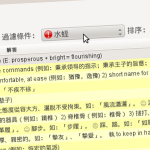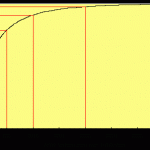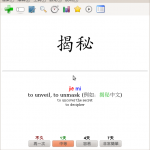Articles in the ‘Vocabulary’ category Page 16
-
Learning Chinese the holistic way: Integrating knowledge
Holistic learning is about integrating what you learn into a web of things you already know and thus making it much easier to learn and remember. This is in contrast with traditional education methods which often emphasise isolated facts and don’t make proper use of what learners already know.
Read → -
Chinese vocabulary in your pocket
Having vocabulary with you so that you can study anywhere isn’t merely a handy trick, it’s essential. You don’t want to waste high quality time at home in front of your computer doing something you might as well do in the super market queue or while waiting for the bus. Study the right things at the right time!
Read → -
Dealing with tricky vocabulary: Killing leeches
Leeches are words or characters that you keep forgetting and therefore consume much more time than other words or characters. Rather than trying to hammer these words into your brain, a specific strategy is needed to kill the leeches. This article deals with just that, how to handle difficult vocabulary you keep on forgetting.
Read → -
Memorising dictionaries to boost Chinese reading ability
Memorising a dictionary is of course not an optimal way of learning vocabulary, but I do think it’s good to use frequency lists (such as dictionaries listing the most common characters) to plug holes in your foundation and make it stronger.
Read → -
Review: Chinese Synonyms Usage Dictionary
This is a review of a very useful synonym dictionary, complete with detailed descriptions and comparisons of commonly confused words. It’s useful both as a dictionary and for studying vocabulary. I recommend the book for anyone from intermediate level and up, but some parts are useful for everyone.
Read → -
Spaced repetition isn’t rote learning
Spaced repetition might on the surface look like it’s rote learning, but I argue that it isn’t. Firstly, spaced repetition isn’t about learning as such. You’re supposed to use smarter methods to learn the words first and then simply review to keep the knowledge fresh. Secondly, spaced repetition won’t degenerate to rote learning if you are alert and avoid cramming of any kind.
Read → -
Using search engines to study Chinese
Studying on your own comes with certain problems I think all language learners have encountered many times. If you encounter a concept you don’t know how to say in the target language, you have to look it up. The first natural thing would be to look in a dictionary or a corpus, but some kinds of questions can’t be answered in this way. Asking a search engine is a very powerful but often neglected tool that I use on a daily basis.
Read → -
Anki, the best of spaced repetition software
Of all the various websites and programs out there to help you learning Chinese, Anki is probably the most important one. There are numerous software to handle vocabulary learning, but in my experience, none of them are as versatile and dynamic as Anki.
Read → -
Spaced repetition software and why you should use it
Spaced repetition means that you review words you want to learn in certain intervals to maximise learning efficiency. Since this involves keeping track of much data, a computer program is needed to handle it properly. Spaced repetition software is very powerful and can be used for many things, but learning vocabulary and characters are perhaps the most important applications.
Read →






